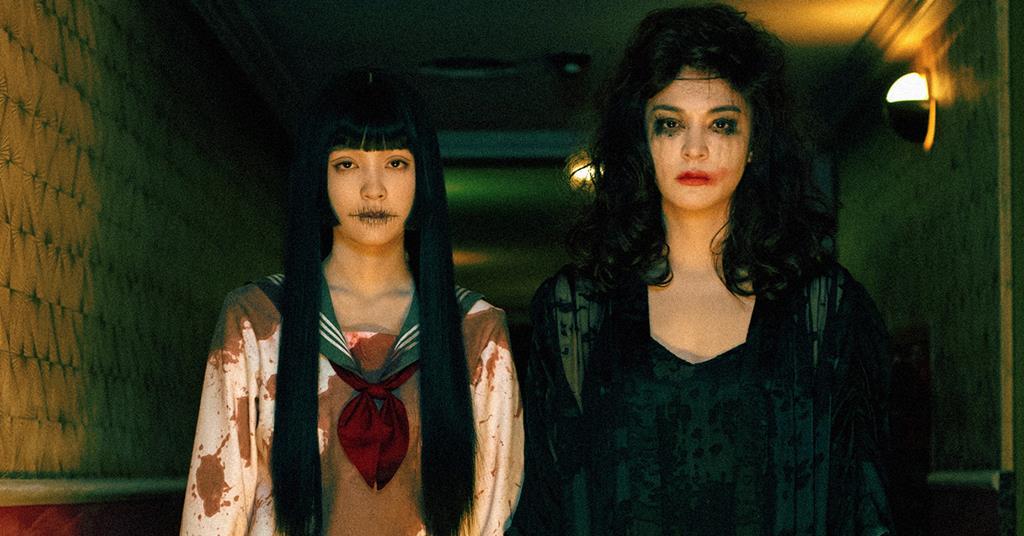Ghosts usually come with a fair bit of baggage in the movies: A tragic romance leading to an even more tragic suicide, maybe, or a howl for justice from a murder victim from beyond the grave. The protagonist of “Dead Talents Society” has no such tale attached to her untimely (and embarrassing) death, and this is where her problems begin. John Hsu’s frightfully entertaining Taiwanese horror-comedy imagines a world where the dead are just as beholden to the pressures of fame as the living, and an industry has grown around ambitious apparitions building their personal brands. Urban legends live forever, and forgotten ghosts literally disappear — so get out there and scare ‘em good, kid!
There’s obvious potential for media satire baked into the concept, and co-writer and director Hsu includes scenes of talk shows, ceremonies, and gala events where the undead stars come out to celebrate the afterlife awards season. Early on, recently deceased hopefuls line up to audition for their “haunter’s license,” a sort of postmortem SAG card that allows holders to be seen by — and frighten — the living. (How? This movie is too zippy to dwell on logistics.) The tone in these scenes is tinged with cynicism about the shallowness and brutal judgements of “the industry,” but that’s not Hsu’s main project here. At its heart, “Dead Talents Society” is an affectionate ode to East Asian horror cinema, and its earnestness — and silliness — are key to its appeal.
Layered in-jokes abound. “It” ghost Jessica (Eleven Yao) rose to fame thanks to a cursed jump-scare web video with shades of “The Ring.” But the real nerds will recognize that she does so while wearing a red dress modeled after one worn by the main character in the climax of Satoshi Kon’s “Perfect Blue.” Another star of the haunted entertainment industry is Little Red Hiking Ghost, a classic J-horror apparition in a red hoodie whose hair completely covers her face and who speaks only in hollow croaks. Recognizing these references is optional, however, and the storyline is engaging enough that even those who don’t get why The Rookie (Gingle Wang) complains that her wardrobe is nothing but white nightgowns and bloody schoolgirl uniforms will have a rollicking, spooky good time.
The cartoonish look of “Dead Talents Society” is indebted to Tim Burton’s “Beetlejuice,” down to the exaggerated mod-goth hairdos on the undead extras. The concept has shades of “Beetlejuice” as well, and Hsu’s world-building is equally delightful, revealing just enough to intrigue while prioritizing jokes and not over-explaining its concepts. Much of the film focuses on a group of misfits led by fading ghost superstar Catherine (Sandrine Pinna), whose jilted-lover hotel haunting schtick slayed in the ‘80s and ‘90s but is losing relevance in the social-media era.
Catherine becomes a reluctant mentor to The Rookie after her right-hand man Matoko (Bo-Lin Chen) recruits the newbie out of pity after a disastrous audition. Joined by The Rookie’s best friend Camilla (Bai Bai) — an underdeveloped character whose status is secure thanks to lavish offerings from her wealthy father — and a colorful crew of assistants, Catherine and The Rookie reach out across the generations to bring terror to the people of Taiwan and the world.
Each character approaches their credible shared motivation — the desire not to be forgotten — from a different angle: Catherine that of the aging diva, and The Rookie that of the insecure newcomer who isn’t sure what her talent is, or if she has any at all. Both also have backstories that add emotional depth to their journeys. And although The Rookie’s hurt feelings over her parents’ neglect are explored in more detail, Catherine’s obliviousness to Matoko’s unrequited love melts her glamorous, icy exterior just enough to make her human (or formerly human, as the case may be).
This all unfolds over the course of the film, which is peppered with horror sequences that range from surprisingly scary — Catherine’s a real pro, let’s put it that way — to zany slapstick comedy. Often, they blend the two, as when The Rookie tries out a routine that sees her running terrified guests out of Catherine’s hotel, then shocking them by jumping off the roof and splattering in front of them on the sidewalk. The wild tonal shift from The Rookie’s gruesome, bloody fall to her childlike joy moments later (she’s battered, but fine — she’s already dead!) could be jarring, or even distasteful. But Hsu presents it with such good humor that the effect is to cheer her on.
These character beats keep “Dead Talents Society” grounded in at least some kind of emotional reality, which is needed given the high-concept wackiness that defines their world. Catherine’s rivalry with the bitchy Jessica and her clique of mean-girl ghosts also drives the high-energy plot, and the editing and writing glide through these satirical scenes before pausing for moments of reflection for our leads. The “Looney Tunes”-esque sound effects and a recurring karaoke bit filmed in cheesy ‘90s pop style add to the ecstatic fun, while a sense of exhaustion at still having to hustle even after death further enriches the themes.
Hsu’s ability to balance the film’s many disparate elements while keeping a solid grasp on character is impressive, showing strong vision and a steady hand. “Dead Talents Society” opened theatrically in Taiwan in August, where it garnered strong reviews and opened at No. 1 at the box office. It’s now touring the international genre-festival circuit after playing TIFF’s Midnight Madness sidebar, where it was the runner-up for that section’s audience award. It won the audience award outright at Fantastic Fest, and it has the potential for crossover buzz if parent studio Sony decides to distribute it theatrically in North America as well. Hopefully it will, because horror-comedies this charming don’t come around often.
Grade: B+
“Dead Talents Society” screened at Fantastic Fest 2024. It is currently seeking U.S. distribution.
Want to stay up to date on IndieWire’s film reviews and critical thoughts? Subscribe here to our newly launched newsletter, In Review by David Ehrlich, in which our Chief Film Critic and Head Reviews Editor rounds up the best reviews, streaming picks, and offers some new musings, all only available to subscribers.




